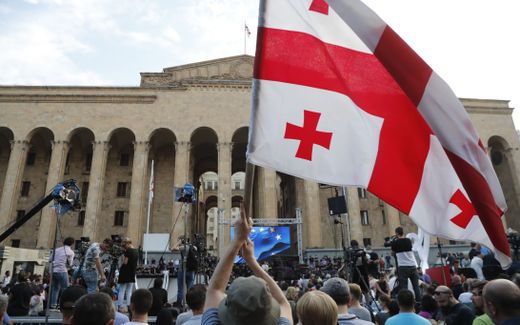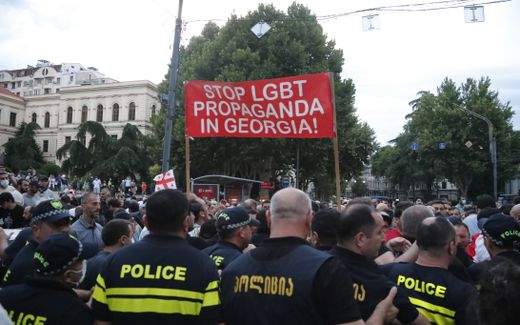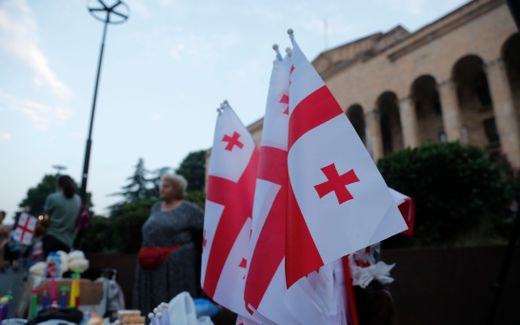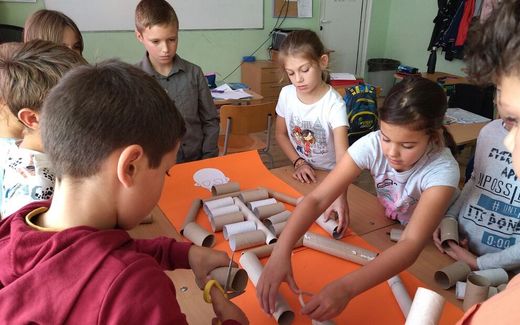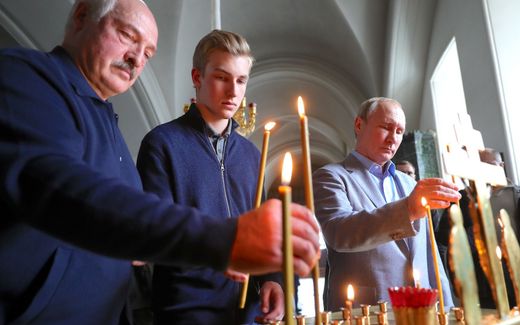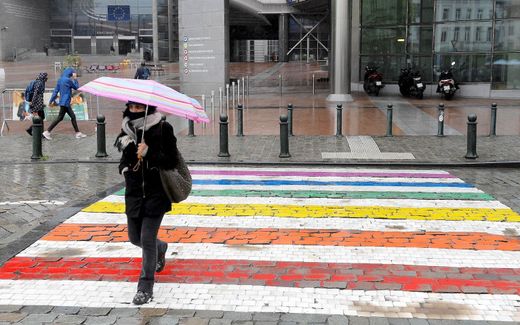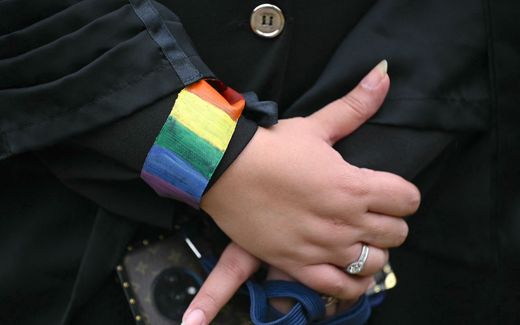Is Georgia the new Russia with its LGBT law?
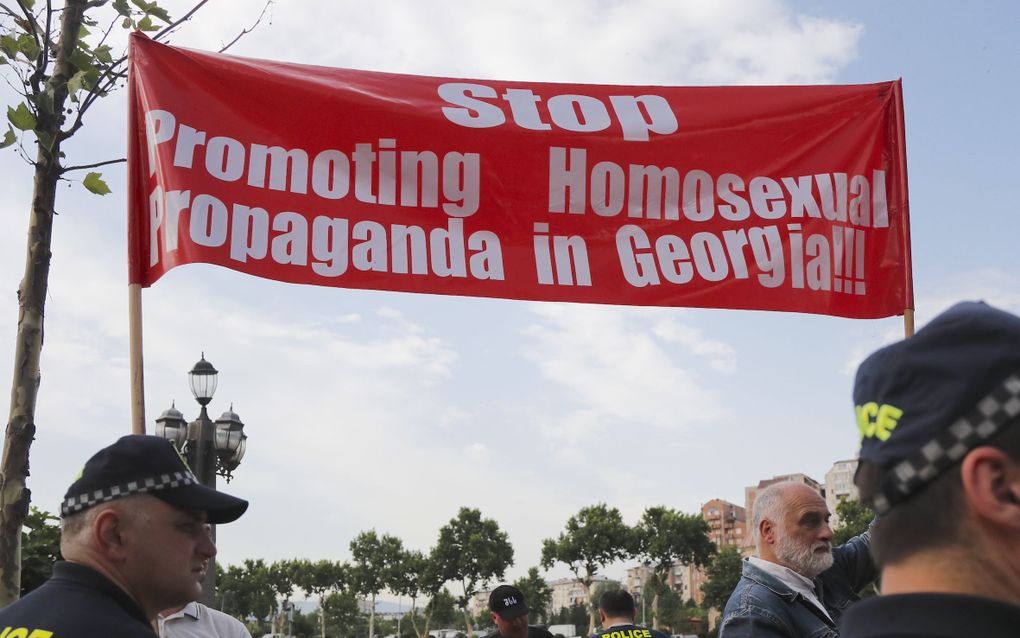
Georgian religious protesters take part in an anti-LGBT protest in front of the Parliament building in Tbilisi, Georgia. Photo EPA, Zurab Kurtsikidze
Eastern Europe
More and more countries in Eastern Europe have adopted a child protection law that forbids the promotion of non-traditional relationships to children. Every time, the EU shows indignance and the nations are accused of following Russia. To what extent is this accusation justified?
Stay up to date with Christian news in Europe? Sign up for CNE's newsletter.
Last week, the Georgian Parliament passed a law about "family values and the protection of minors." The proposal included a legal basis for banning pride events and raising the rainbow flag. In addition, it confirms traditional marriage of a man and a woman, and bans gender reassignment surgery. Also, broadcasters would be forbidden to air ads or information that promotes LGBT relationships and incest or any footage that shows such content. Also, censorship will be applied to books and movies. The Georgian ruling party, Georgian Dream, argues that the law is necessary to protect traditional moral values.
Sexual orientation
Georgia is not the only country that sharpens its LGBT laws. In August, Bulgaria adopted a child protection law that forbids the promotion of non-traditional relationships among children. The law bans "propaganda, promotion or incitement in any way, directly or indirectly, in the education system of ideas and views related to non-traditional sexual orientation and/or gender identity other than the biological one", Radio Free Europe stated at the time.
A few years earlier, in 2021, EU member state Hungary introduced its controversial child protection law. Depicting diverse gender identities and sexual orientations in schools, on television, and in advertisements has been forbidden ever since. Also, children's books that have LGBT content are banned.
This year, the law was tightened with new rules. Now, for example, it is also forbidden to display items in a shop window that promote or show a deviation from sex at birth, gender reassignment or homosexuality CMS Law-Now writes.
Russia is a country that has had strict LGBT laws for a longer period. The country knows an anti-LGBT propaganda law as well. It forbids the promotion of non-traditional relationships. Therefore, countries that just introduced a new LGBT law are often compared to these states and not in a positive way. Is that justified?
Protector
To find an answer to that question, it is necessary to have a look at the broader context of the LGBT laws. In Russia, which sees itself as the advocate and protector of traditional Christian values, the LGBT community is forced to operate underground. The Russian Supreme Court classified the international LGBT social movement as an extremist organisation last year, which means in practice that it is forbidden.
At the same time, Russia officially banned gender reassignment surgery and legal gender change. Not only activists but also people who show support for LGBT ideas are criminalised, Time Magazine writes.
Although Russia was one of the first countries to decriminalise same-sex relationships in 1993, it now makes it impossible for people to live in non-traditional relationships in practice, even though it is strictly not forbidden. Anyone participating in activities of the LGBT movement risks a prison sentence of years. Raising a rainbow flag can result in trouble, too.
Pride Parade

How is that in other countries with strict LGBT laws? In Hungary, for example, it is not illegal to live in a same-sex partnership or to participate in a Pride March. According to Radio Free Europe, the number of participants is even growing. Some argue that the child protection law that Hungary introduced actually led to more discussion of the LGBT topic. These discussions also happen at a political level.
In Georgia, same-sex couples do not have the possibility to get married or register their partnership. The new law most likely also means the end of the Pride March that used to be held in Tsibili, the Georgian capital.
Georgia's constitution does not explicitly define marriage as a relationship between a man and a woman. However, the new legislation seems to fill that gap, AP News writes.
Bulgaria permits same-sex couples to live together, and gay bars are allowed to exist as well. In addition, there is an annual Pride Parade in the capital Sofia. And even though the new law forbids the promotion of non-traditional sexuality in education, schools are still allowed to mention homosexuality as something that exists.
The American LGBT law
Not only East-European countries have a history of strict LGBT laws. Even the United States had one until 2013. This law, known as the Defence of Marriage Act (DOMA), banned federal recognition of same-sex marriages and defined marriage as a union between one man and one woman.
That meant that same-sex marriages concluded abroad were invalid in the United States. In practice, same-sex parents were not recognised as legal guardians of the biological children of their spouse, for example.
The law was struck down by the US Supreme Court in 2013 but not officially repealed until 2022.
Children
In short, there are definitely some similarities between the LGBT laws in Russia and those in other European countries. The new law in Georgia, for example, seems to have many similarities to the Russian LGBT laws forbidding Pride Marches.
Also, the laws against LGBT propaganda show several similarities with the Russian legislation. However, in Russia and Georgia, this ban applies to all ages, while in Bulgaria and Hungary, the ban on propaganda is aimed at protecting children specifically.
In addition, there is quite a bit of difference in the extent to which LGBT people live in freedom. Whereas in Russia, showing support to the LGBT community is enough for a legal penalty, Bulgarians, for example, are free to participate in Pride marches.
Orthodox
However, what all countries with strict LGBT legislation have in common is that the Orthodox church plays an important role in society and also influences politics to some extent. This could be a driving force behind the "traditional values" movement in these countries.
For example, the Russian Orthodox Church stated earlier that it supported firm resistance against "Western values such as LGBT propaganda and non-traditional relations", as CNE reported.
The same applies to Georgia, where the Orthodox churches take a firm stance against the LGBT community. For example, in 2023, the church already called for a law against LGBT propaganda, as OC Media reported. And the Orthodox Church in Georgia has a strong influence on society, Jam News analysed last year.
For politicians, it is almost necessary to be on good terms with the church in order to be successful in their careers. Therefore, it may be concluded that the stance of the church on LGBT issues trickles down into the political arena in Georgia.
Mouthpiece
At the same time, it is difficult to determine to what extent the church influences politics in this country and to what extent the church is influenced by the political climate itself. In Russia, for example, the relationship between state and church only leaves a certain space for the church to operate within. It is not really free to speak out against the government, and sometimes, it functions more as a mouthpiece for the government.
Nevertheless, an earlier Pew Research study shows that close to half of religious leaders in Russia, Georgia and Bulgaria have some to a large influence on what happens in politics.
Related Articles


